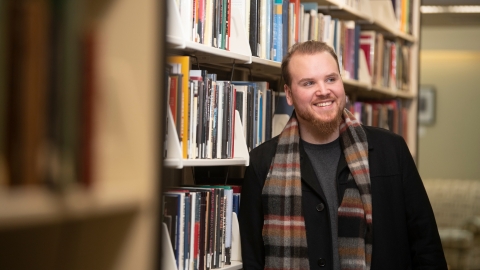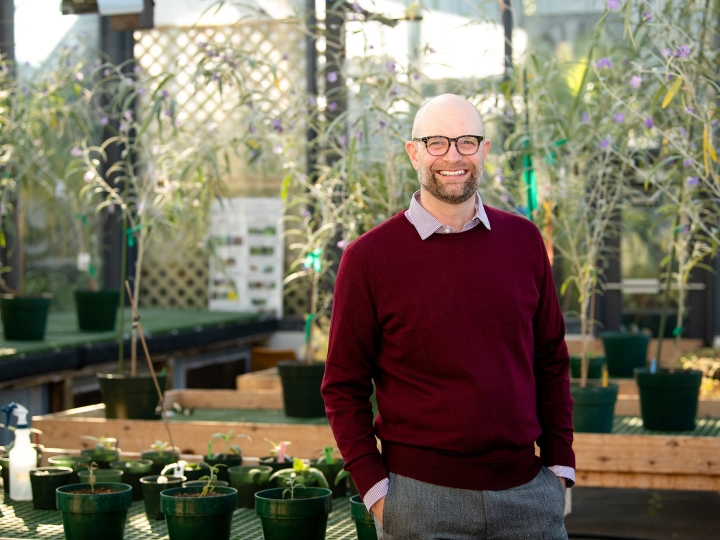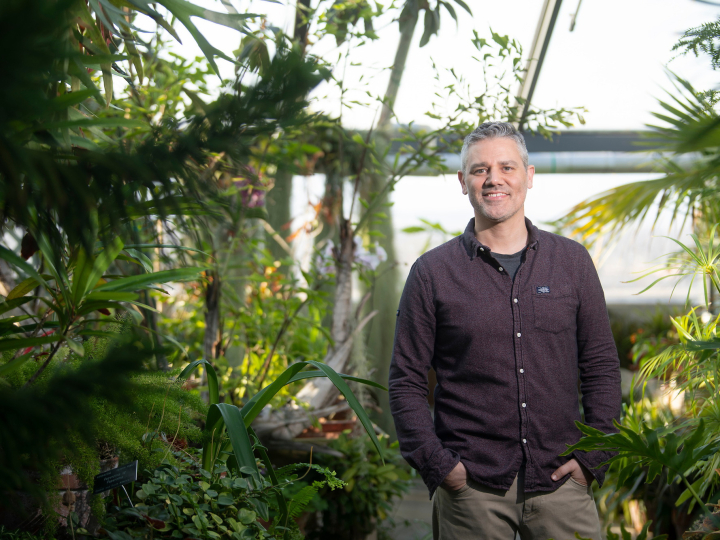
Bucknell Student Studies Reform Strategies by Going Inside Local Penitentiary
March 4, 2020
Rich Stover '20's research examines the effectiveness of character-building programs for inmates with life sentences. Emily Paine, Communications
Rich Stover '20 never thought his most transformative college experience would happen inside of a prison. He didn't think much about prisons at all before stepping inside SCI Coal Township, a medium-security penitentiary located about 30 miles from Bucknell.
It all changed when the sociology major from Lewisburg, Pa., became part of a Bucknell cohort that participated in the Inside-Out Prison Exchange program, an international education project that brings college students and inmates together for a semester-long class held inside a prison. It was here, while getting to know inmates as classmates, that Stover met the men who would become the focus of his senior thesis — inmates with life sentences who had reformed their character.
"These inmates have broken out of the stereotype of who an incarcerated individual is. In the process, they've gained some control over their own narratives," Stover says. "I really wanted to see how that's fostered inside a prison."
To find out, Stover interviewed members of SCI Coal Township's Lifeline Association, a philanthropic organization run by prisoners. Lifeline raises money for local charities by selling products and donating the profits. The program's participants include inmates serving 10 or more years who have modeled good behavior since being incarcerated.
"I became really fascinated by them and the personal processes they underwent to become charitable inmates," says Stover, whose research examines the effectiveness of character-building programs for inmates with life sentences. "I found that the men who are most prepared to re-enter society are actually the ones with life sentences who participate in groups like Lifeline."
Charting Change
The summer between his junior and senior year, Stover conducted interviews with 22 Lifeline members, seven of whom sit on the program's board of directors. Using a 30-question survey as a guide, Stover asked the inmates to narrate their lives, from childhood to the crimes that led to their life sentences. For some, the interview was the "first real conversation they'd had since entering prison," Stover says.
"What they ended up revealing to me about their pasts is stuff they don't normally talk about with psychologists or corrections officers," says Stover, who met with inmates one-on-one in a soundproof attorney's room. "Some of the rawest, most emotional moments I've experienced in my life happened while witnessing these 'hard' men being vulnerable and honest."
Their stories resulted in more than 120 pages of handwritten notes, from which Stover drew his data. When charting a course of transformation, he found that most of the inmates encountered a change of character after receiving mentorship from older, well-respected prisoners.
"There are people who have committed incredibly terrible crimes who have also dedicated themselves to changing their lives and the lives of other people," he says. "If the paradigm of American incarceration is going to change, it starts with those who are incarcerated."
A Transformative Experience
To say his experience was life-changing would be an understatement, Stover says. The project not only deepened his empathy for incarcerated individuals, but it also ignited a passion for advocacy that has informed his aspirations. After graduating, Stover plans to pursue a master's degree in public policy, where he believes he will be "most effective in combating injustices on a macro level."
Until then, the sociology major is working to provide similarly transformative experiences as a teaching assistant for this year's Inside-Out course, taught by Professor Carl Milofsky, sociology — the same class that first took Stover inside the prison two years ago.
"As an undergraduate researcher, this was a great educational opportunity because I got thrown into the deep end of an incredibly difficult setting, population and theme," Stover says. "If there's one thing that's come out of this project for me, it's knowing that there are a lot of really positive things happening inside of prisons."

